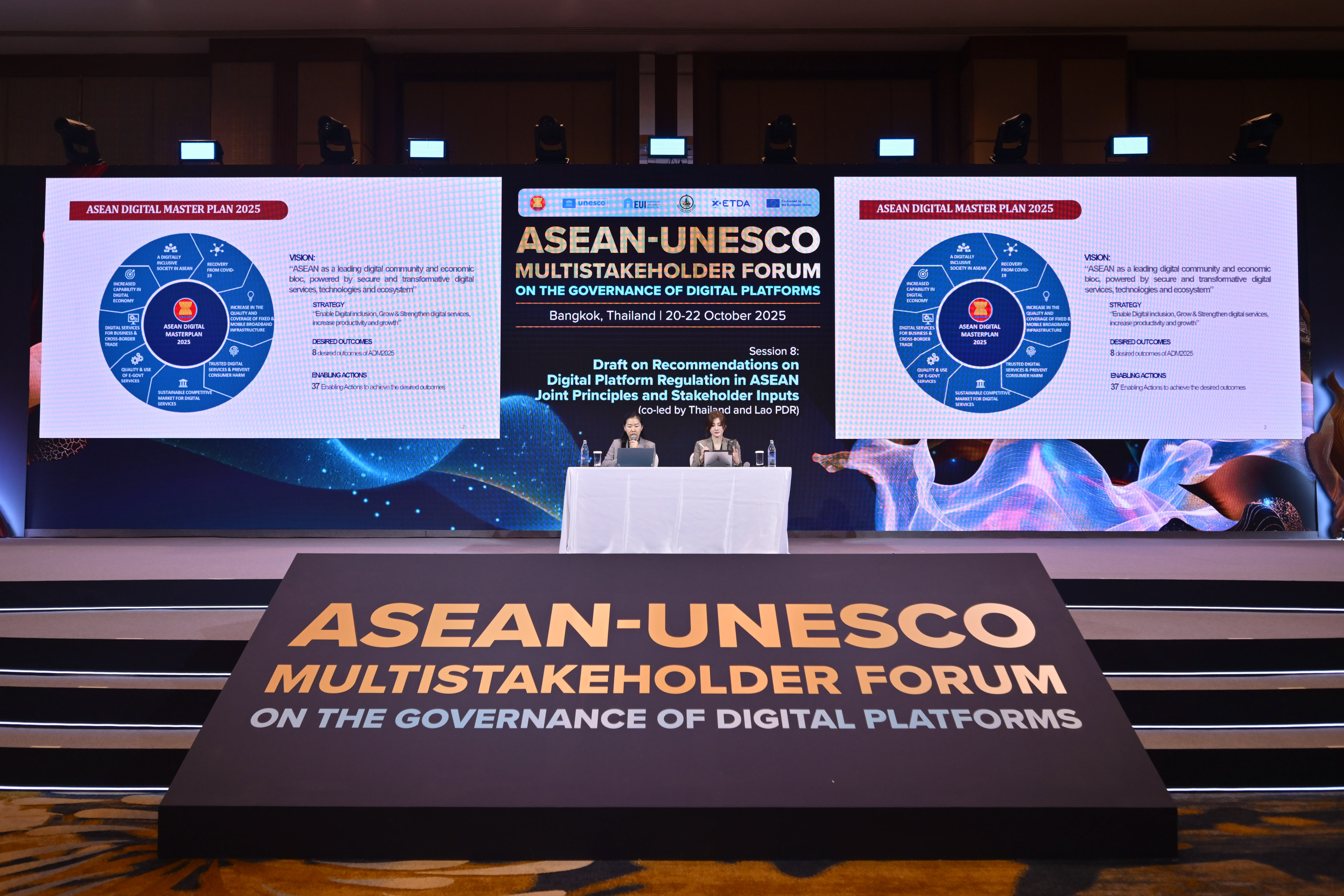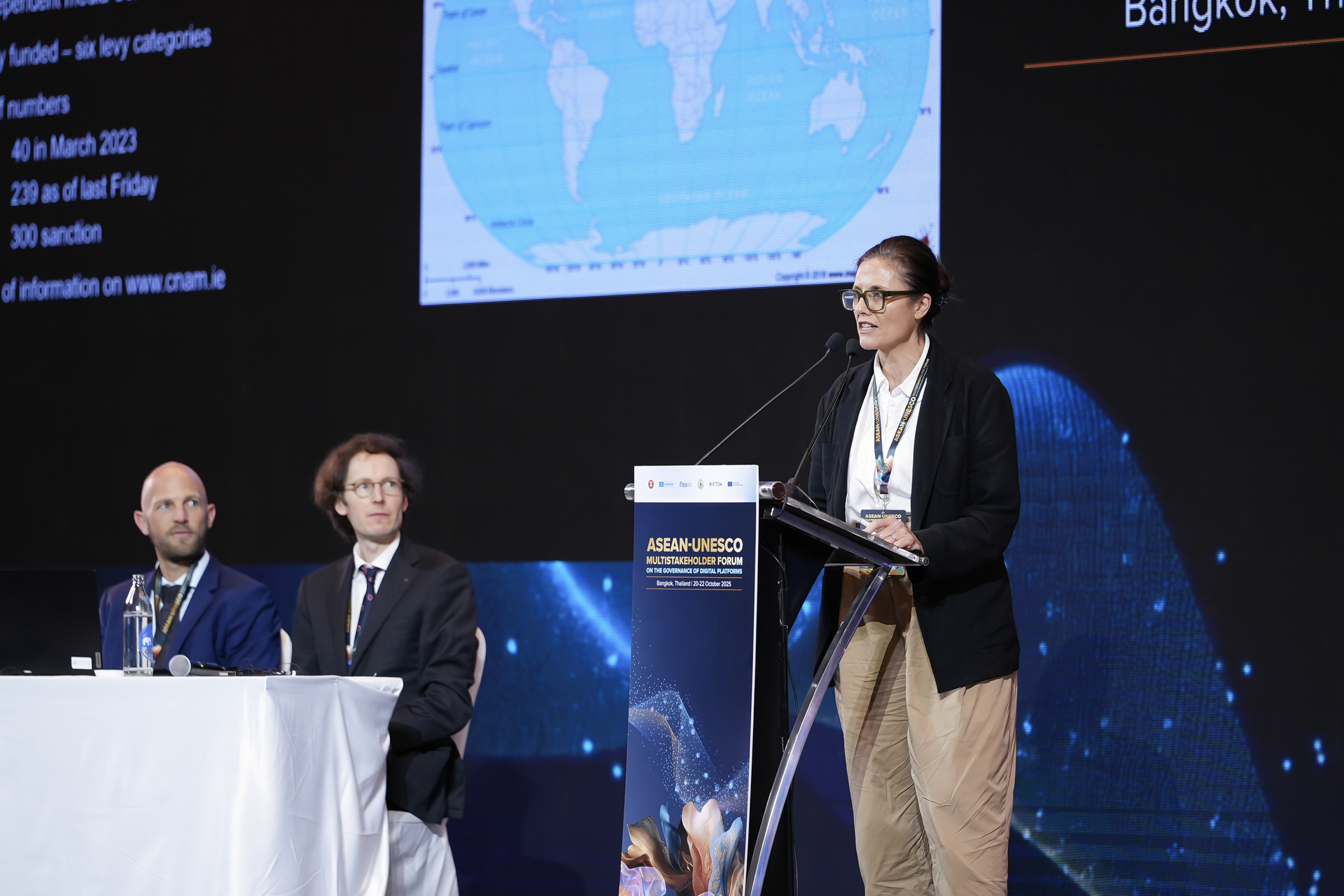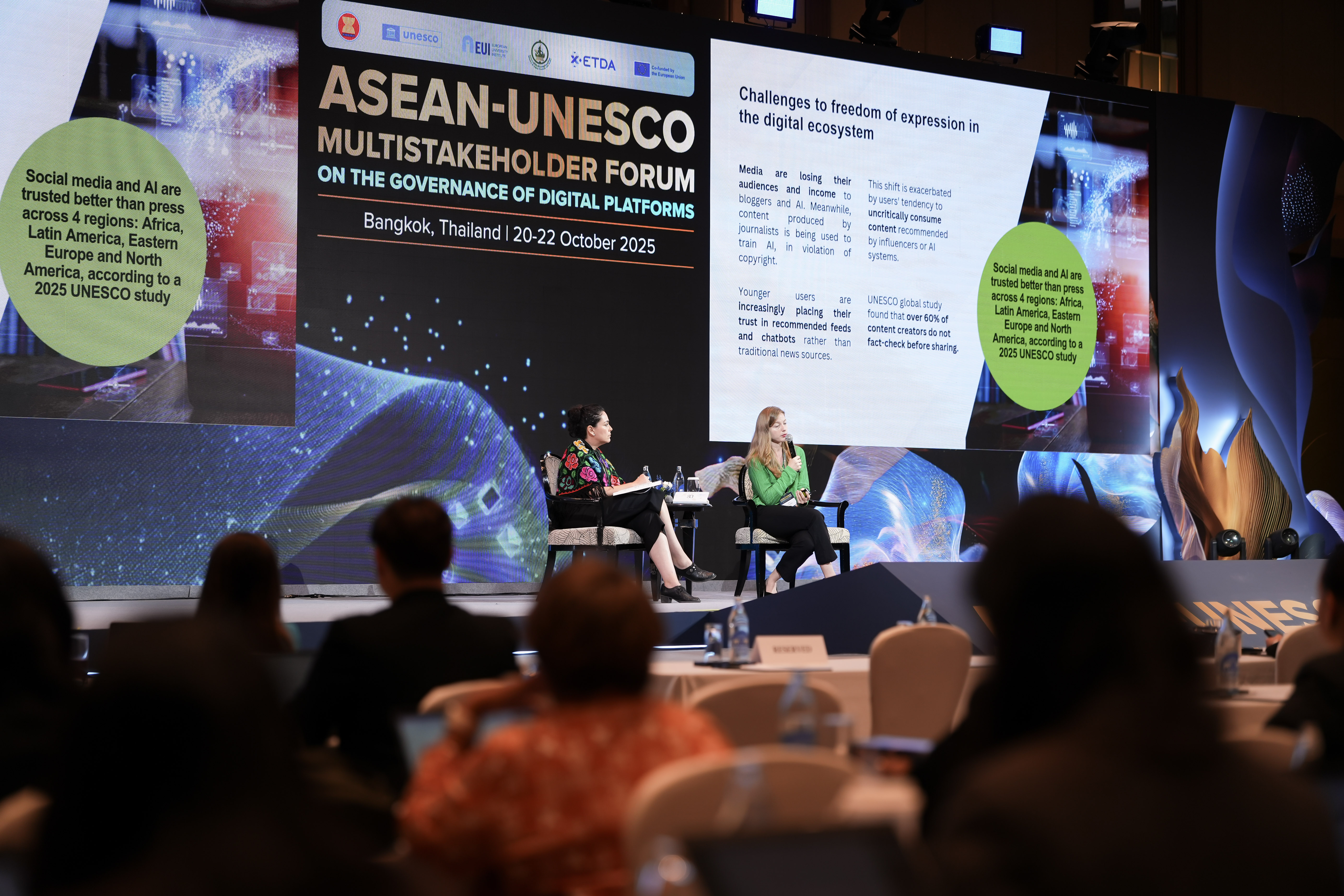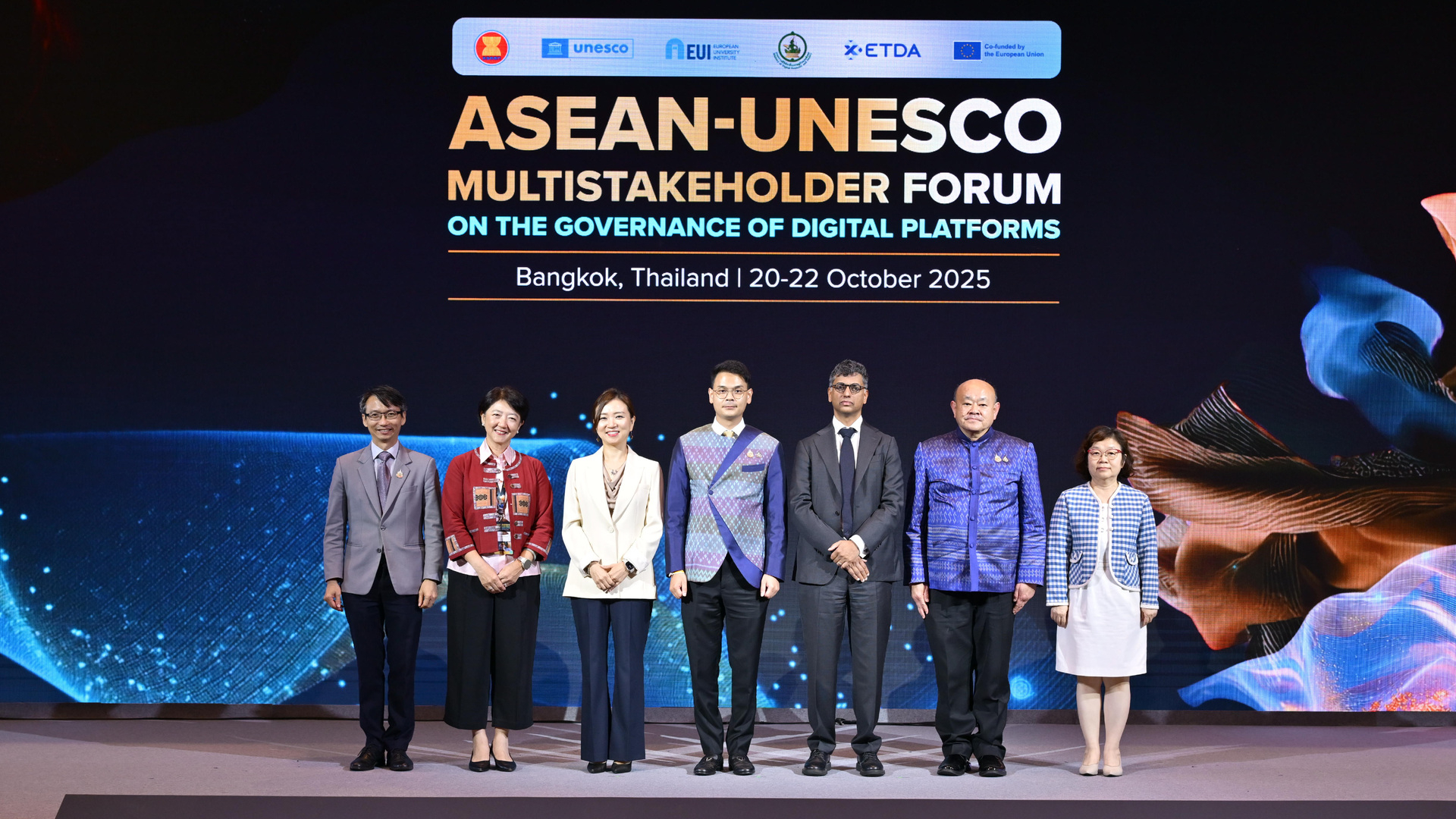“No single country, nor any single sector, can tackle digital challenges alone,” said H.E. Mr. Chaichanok Chidchob, Minister of Digital Economy and Society (MDES), who delivered opening remarks at the ASEAN–UNESCO Multistakeholder Forum on the Governance of Digital Platforms, an international conference co-organized by the Ministry of Digital Economy and Society, the Electronic Transactions Development Agency (ETDA), the ASEAN Secretariat, the United Nations Educational, Scientific and Cultural Organization (UNESCO), and the Global Initiative on the Future of the Internet (GIFI) under the European University Institute (EUI). The forum took place from 20–22 October 2025 in Bangkok, Thailand.
This statement was not only central to the forum but also underscored a shared commitment to advancing multistakeholder governance — the very approach ASEAN needs in an era when digital platforms increasingly shape people’s daily lives. Minister Chaichanok Chidchob emphasized that Thailand stands ready to serve as a regional hub for cooperation, driving a safe, transparent, and equitable digital ecosystem. The ultimate goal, he noted, is not only to protect users but to build digital trust — the cornerstone of the region’s future digital economy.
He further highlighted three key priorities for Thailand:
- Cross-border collaboration: ASEAN countries must jointly establish a set of common rules to manage risks posed by digital platforms operating across jurisdictions.
- User empowerment: Citizens should have the right to control their own data and make informed decisions based on transparency.
- Fair digital economy: A level playing field must be created to prevent large platforms from monopolizing the market or shaping social direction unilaterally.
This marked the beginning of a truly regional conversation — one that does not seek a single answer, but instead opens space for all sectors to participate. More than 350 participants from over 20 countries, including representatives from ASEAN Member States, the European Union (EU), UNESCO, academia, the private sector, and civil society, came together to exchange insights and co-develop approaches for digital platform governance — in an era where technology and human rights must advance hand in hand.
When 'Digital Platforms' Become the Infrastructure of Daily Life
Digital platforms have become the “infrastructure of everyday life” — shaping how people trade, learn, communicate, and consume information. Across ASEAN’s population of over 650 million, citizens increasingly depend on digital systems in nearly every aspect of their lives. In many countries, the platform economy now accounts for a growing share of GDP. It is projected that ASEAN’s digital platform economy will reach USD 159 billion in 2025 and expand to USD 2 trillion by 2030, underscoring how platforms have become a new engine of regional growth — spanning e-commerce, the gig economy, and digital services trade that generate both economic momentum and new employment opportunities for millions. On the other hand, these same platforms also bring complex, cross-border challenges — including disinformation, online scams, personal data breaches, privacy violations, and unfair competition — all of which affect users, consumers, businesses, and governments alike.
This has become one of the 'shared challenges' recognized by experts, government representatives, international organizations, private sector leaders, academics, and civil society participants at the forum. They agreed on the need to collectively establish 'new rules' that will enable digital technologies to grow responsibly — while maintaining a balance between 'innovation, economic progress, and human rights' across ASEAN. Such cooperation must align with global standards and remain sensitive to the unique contexts of the region.
Lessons from Europe: Building Rules for Transparency and Fair Competition
The forum spotlighted 'Europe' as a region that has established a strong foundation for digital platform governance through the EU’s Digital Policy Framework, anchored by two landmark laws — the Digital Services Act (DSA) and the Digital Markets Act (DMA). These acts serve as models of ex-ante regulation, emphasizing preventive governance rather than reactive enforcement. A representative from the European Commission’s Directorate-General for Communications Networks, Content and Technology (DG CONNECT) explained that the DSA and DMA function as 'complementary laws'. The DSA focuses on protecting users and society, holding platforms accountable for systemic risks such as disinformation, harmful content, rights violations, and opaque algorithms. The DMA, on the other hand, targets fair competition, ensuring that major 'gatekeeper' platforms operate fairly and allow smaller businesses to compete and access markets. Both laws share a common goal — to establish a co-regulatory ecosystem among governments, businesses, and users. This approach goes beyond legal penalties to foster shared responsibility in designing, enforcing, and monitoring rules, while cultivating a 'culture of transparency' in which all actors are expected to disclose information, enable oversight, and uphold accountability.
A representative from Coimisiún na Meán, Ireland’s media and online platform regulator, further shared practical insights from implementing the DSA at the national level. Ireland established an independent body known as the Digital Services Coordinator (DSC) to oversee compliance, address user complaints, and audit platform transparency directly. They emphasized that law alone is not enough — education, awareness, and technical understanding are equally essential. Irish regulators, therefore, are also developing “algorithmic literacy” — an understanding of how algorithms work.
UNESCO’s Perspective: Digital Governance Must Be Grounded in Human Rights
The forum also shed light on a new dimension of 'Digital Governance' through insights from experts involved in UNESCO’s Global Guidelines on the Governance of Digital Platforms. This framework adopts a human rights–based approach, emphasizing that governance should not restrict freedom of expression, but instead promote responsible management of online spaces. UNESCO underscored that effective platform governance requires 'Multistakeholder participation' — not only from governments, but also from platforms, private sector actors, civil society, researchers, and the media. Overreliance on state control alone, they warned, could unintentionally lead to limitations on fundamental freedoms.
Importantly, UNESCO representatives also highlighted the example of UNESCO’s Social Media 4 Peace (SM4P) initiative in Indonesia, which found that global platforms often rely on English-language content moderation systems rather than local languages, allowing harmful or distorted content in other languages to slip through the cracks, while also removing content that is inaccurate within a country's cultural context. UNESCO therefore proposes that 'Good Governance of Digital Platform Services' requires an understanding of local context and cultural and linguistic diversity. Another key tool UNESCO is promoting is Media and Information Literacy (MIL), which helps users understand the underlying mechanisms of platforms, identify fake news, and mitigate the risk of algorithmic influence.
During the workshop on 'Incorporating Media and Information Literacy and User Empowerment in Platform Governance,' participants from multiple countries discussed how media literacy extends beyond detecting fake news. It also involves understanding the 'Attention Economy and the mechanisms of algorithms' that shape human behavior, social discourse, and public opinion in today’s digital age.
Voices from ASEAN: Toward Shared Digital Principles for the Region
Voices from across ASEAN echoed a strong collective commitment to shaping the region’s forthcoming ASEAN Digital Principles — a foundational framework that will guide responsible digital development.
During the Forum, representatives from Member States shared their perspectives and approaches. Indonesia emphasized the concept of “Digital Sovereignty”, underscoring the protection of users and data security while advancing “Platform Accountability” to ensure that platforms are held responsible for their societal impacts, such as online fraud and misinformation.
Ireland, though not an ASEAN Member State, offered a noteworthy case study in establishing an independent regulatory structure that works closely with global platforms. It introduced the concept of a Digital Regulator Network, linking multiple oversight bodies to strengthen coordination.
Meanwhile, Lao PDR and Thailand, as co-hosts of the ASEAN Project, presented a draft of the “Recommendations on Digital Platform Governance in ASEAN”, which outlines nine key priority areas — for example disinformation management, transparency and fairness, online scams, algorithm and AI governance, personal data protection and digital users’ rights.
Several participants from ASEAN countries agreed that regional digital governance should be built upon “Joint Principles” rather than a single uniform law. This approach allows each country to adapt implementation to its own context while maintaining the shared core values of transparency, fairness, and respect for human rights.
From Platforms to Generative AI: The Next Chapter of Digital Governance
As digital platforms have become the central space for communication, work, and access to information worldwide, Generative AI has begun to amplify their capabilities — bringing both opportunities and new challenges in terms of trust, fairness, and data safety.
Experts at the Forum emphasized that Generative AI is not only a tool for content creation but also a powerful force shaping thought, truth, and discourse in the online world. Without transparent governance, these influences can have profound implications for human rights and freedom of expression.
The concept of “Safety by Design” emerged as a guiding principle — shifting focus from reactive regulation to proactive design. This means embedding responsibility and safety into the very foundation of technological systems, such as addressing algorithmic bias, preventing deepfake misuse, and protecting vulnerable users.
The ASEAN–UNESCO Multistakeholder Forum on the Governance of Digital Platforms highlighted that effective regulation is not about limiting freedom — it is about designing systems where freedom and responsibility can coexist.
Participants collectively agreed that the future of digital governance should rest on three core pillars:
- Transparency – clarity in data and algorithmic processes
- Accountability – shared responsibility between platforms and governments
- Empowerment – enabling users with the rights and literacy to shape their own digital experiences
Ultimately, the goal extends beyond building a framework for digital governance — it is about co-creating a digital future where everyone shares responsibility for the systems that shape our societies.


.jpeg)



